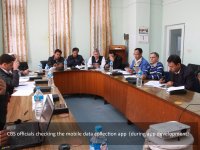The Gauteng Department of Education (GDE) is committed to accelerating the use of ICT in education as part of its strategy to improve teaching and learning in all schools. The GDE seeks to ensure that schooling in Gauteng benefits from new developments in technology and from other educational innovations that can enhance the delivery of quality education.
Innovation Tag: Mobile
Carrot Rewards is a platform promoting healthy living and public engagement that leverages behavioural economics, mobile tech and the power of loyalty programs to motivate and educate users to make better everyday lifestyle choices for themselves, their families and the planet. Created in collaboration with public sector agencies, leading Canadian health NGOs and the private sector. With over a million downloads, Carrot is driving sustainable positive behaviour change on a population scale.
With the complex service system, it is difficult to help young people with numerous problems. The MY LIFE working method is a co-created, human service integration for young adults, complete with case management, a survey assessment, and an ePlatform.
In order to support the operation of certified cash registers, the Financial Administration (FA) launched a crowd-sourcing campaign in 2016 for the purpose of motivating consumers to receive an invoice, take it, check whether it is correct and send it to the FA. This way, every citizen was able to contribute crack down on invoice fraud and to reduce the shadow economy (which is the part of an economy involving goods and services which are paid for in cash, and therefore not declared for tax.)
SPID (Sistema Pubblico di Identità Digitale, or Digital Identity System) is a solution for accessing public administration online services through once-only digital identity (user & password) generated by private Identity Providers. It can be used from any device (PC, tablet & smartphone) by citizens. SPID aims to improve the relationship between citizens & the public administration by expanding the digital approach in using public services.
The Ministry of Economic Development and the National Clearing House implemented a program to promote cashless payments in public administration. Our goal is to develop a model for acceptance of non-cash payments using point of sale (POS) terminals and enable the use of virtual terminal (WebPOS Paybynet) in public sector, which is free for both the administration and the citizens.
In April 2015, a 7.8 Mg earthquake hit Nepal that affected over 1 million households and 5.08 million people. Disbursement of reconstruction funds called for a massive door-to-door survey in order to identify true beneficiaries. For the first time, Nepal and the Kathmandu Living Labs deployed a team of 3,000 engineers armed with electronic tablets to collect 10 TB data and 10 million photographs from remote parts of Nepal in just over 120 days.
The Namibia Institute of Pathology Limited (NIP) is the largest diagnostic pathology service provider in Namibia that operates 40 laboratories and 5 patient centers located in 14 regions across the country. The health facilities in the country are very far apart. NIP disseminates laboratory results via SMS printers deployed to 234 remote clinics using GSM cellular network.
The projects uses Telemedicine technology to deliver healthcare at a distances from the tertiary and secondary health facilities to the Internally Displaced Persons (IDP) camps.
Case Study
MAGMA Indonesia (Multiplatform Application for Geohazard Mitigation and Assessment in Indonesia)
MAGMA Indonesia is an system that streamlines the process of geological hazard mitigation. It raises the bar on the standard of data monitoring and management for Indonesian government agencies. MAGMA digitizes relevant geological data into integrated databases, making them easier to analyze and use. Frequent readings and analytics can now be made ready in an almost-real-time manner. As a public service, MAGMA makes geological hazard mitigation and assessment available for free, anytime and…


